Period 3
Period 3(Section B 1a—1e)
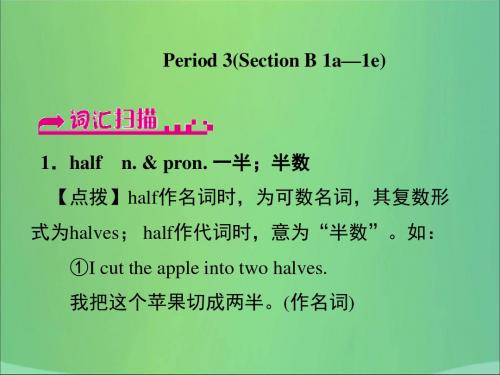
1.half
n. & pron. 一半;半数
【点拨】half作名词时,为可数名词,其复数形 式为halves; half作代词时,意为“半数”。如: ①I cut the apple into two halves. 我把这个苹果切成两半。(作名词)
①My father likes taking walks after dinner.
我父亲喜欢在晚饭后散步。(作名词)
②He walks to school every day.
他每天走路上学。(作动词)
【延伸】(1)walk作名词时还可以表示“地位;
阶层”。如:
She has friends from all walks of life.
她在社会各界中都有朋友。
(2)含有walk的词组:walk sb. to sp. 护送某人
到某地; walk out 突然离开,退席; walk into
sth.(走路时)撞着某物; take sb./a dog for a walk带某
人去散步/遛狗。
②Out of fifty students, half passed.
五十位学生,一半通过了。(作代词) 【延伸】(1)half 作名词时还可以表示“(啤酒等 饮料的)半品脱”;half还可以作副词,意为“到一 半程度;半”。如: ①Two halves of beer, please.
请来两份半品脱的啤酒。
【延伸】(1)past 作形容词时还可以表示“结束
的;完成的”。如:
Winter is past and spring comes at last.
冬天过去了,春天终于来临了。
人教版(2024)七年级英语上册Unit 3+Period 3 Grammar Focus

3.运动场前面有一些树。
There are some trees in front of the sports field.
一、there be句型(存现句)
·英语
·英语
否定句:there be句型的否定句式的构成和含有be动词的其他句型一样, 在be动词后加上“not”。也可用“no”来表示,即:no+n.(名词)=not a/an/any+n.(名词)。 注意:no+n.(可数名词单数)=not a/an+n.(可数名词单数); no+n.(可数名词复数)=not any+n.(可数名词复数); no+n.(不可数名词)=not any+n.(不可数名词)。如: There is no orange in her bag.→There isn’t an orange in her bag.她的包里没 有橙子。 There are no oranges in her bag.→There aren’t any oranges in her bag.她的包 里没有橙子。 There is no juice in the bottle.→There isn’t any juice in the bottle.瓶子里没有 果汁。
There is an apple on the desk.
·英语
二、表示方位的介词和介词短语 1.概述 介词一般用于名词或代词前,表示该词与句中其他成分的关 系。介词后面的名词或代词称为介词宾语。介词宾语若是人 称代词,则要用宾格。介词和介词宾语合在一起构成介词短 语。本单元重点讲解表示方位的介词和介词短语。
on
“在……上面”,表 There is a book on the desk. 示在某个表面上 书桌上有一本书。
译林版新教材 三上 U2 Period3 教案

Unit 2 What’s your name?(Period 3)Step 1 RevisionT: Good morning. I’m... What’s your name?S: My name is....T: May I have your name?S: My name is...T: Your name, please?S:.....T: Wow. You can tell me your name. Except my name is ..., what else can you say? S: I’m........T: Good! You try, please.S:.......T: Here is the assessment, how many stars will you get?S:T: Good! But can you ask someone’s name?S:......T: Yes. The very formal way is asking “What’s your name?”.We also can ask “May I have your name?”“Can I know your name?”, sometimes we say “Your name, please?” for short.S:......T: Here is the assessment, how many stars will you get?S:........Step 2 PresentationT: Good! This is the way we know someone’s name. Now let’s have a look at how we make friends. First look at themS:(看图)T: How do they talk?S: Hi, I’m....T: Yes. Bobby and Sam meet in the park. They talk, then they become friends.Look at them.T: How do they talk?S: Hi, I’m.... What’s your name?T: Yes. Su Hai and Mike meet at school. They talk, they become friends too.T: Look at the boys. How do they make friends? Please look at these pictures, who are they? What are they talking? Try to say.S:......T: Nice, I like your ideas. Now let’s listen what they are saying. And please order these pictures.S:...T: Let’s read their dialogues together.Step 3 Practice1.Ask and answerT: Now you must know how to make new friends. Make up a dialogue with yourpartner.S:........T: Please work in pairs. Then show in class.S:.......2.Have a competitionT: Next let’s have competition for making friends. First, we need to make a name card. Then we go to talk with the other and make friends with him/her, we can get his/her name card.Let’s see who can get the most name cards and who can make a self-introduction?S:.....T: Do you know how to make a name card?S:.....T: You may write your names on a piece of paper, then fold like this. Here’s a tip for writing your names in English. A tip: Both of the first letters of our family name and given name should be capitalizedS:(把名字写到白纸上)T:You can fold like this.S: (照样子折叠)T: Now we’re ready for the competition. You have one minute to make friends.(课件出现一分钟倒计时。
人教版英语三年级上册Unit 1 Period 3教案与反思
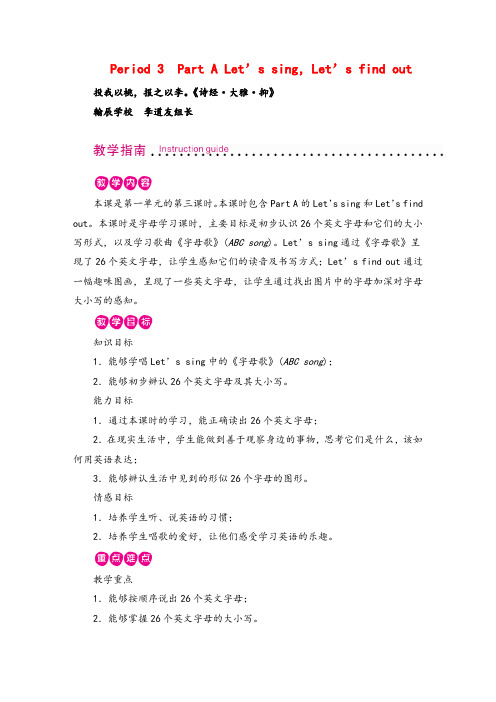
Period 3 Part A Let’s sing,Let’s find out 投我以桃,报之以李。
《诗经·大雅·抑》翰辰学校李道友组长本课是第一单元的第三课时。
本课时包含Part A的Let’s sing和Let’s find out。
本课时是字母学习课时,主要目标是初步认识26个英文字母和它们的大小写形式,以及学习歌曲《字母歌》(ABC song)。
Let’s sing通过《字母歌》呈现了26个英文字母,让学生感知它们的读音及书写方式;Let’s find out通过一幅趣味图画,呈现了一些英文字母,让学生通过找出图片中的字母加深对字母大小写的感知。
知识目标1.能够学唱Let’s sing中的《字母歌》(ABC song);2.能够初步辨认26个英文字母及其大小写。
能力目标1.通过本课时的学习,能正确读出26个英文字母;2.在现实生活中,学生能做到善于观察身边的事物,思考它们是什么,该如何用英语表达;3.能够辨认生活中见到的形似26个字母的图形。
情感目标1.培养学生听、说英语的习惯;2.培养学生唱歌的爱好,让他们感受学习英语的乐趣。
教学重点1.能够按顺序说出26个英文字母;2.能够掌握26个英文字母的大小写。
通过大声读、用手写写画画、知识竞猜等形式多方面了解26个英文字母。
教学难点1.能够完整地说出26个英文字母;2.能够掌握26个英文字母的发音。
通过让学生反复跟唱《字母歌》,帮助他们记忆字母及其顺序;通过让教师逐一教读字母的方式帮助学生掌握26个英文字母的发音。
教师在课前准备写有26个英文字母(包含大小写)的彩色卡片、生活中含有英文字母图形的照片、表示文具的单词卡片、录音机、多媒体课件等。
Step 1:Warmup教师将写有表示文具的单词卡片展示给学生看,然后用“I ook,I .Look at t.Ss:Pencil.T:etters are tetter in t”.Wetters can we see in t”?Ss:p,e,n,c,i,l!T:Yes.教师通过上一课时已经学过的单词和句式导入课程,使各个环节衔接更加紧密。
高中英语 Unit3 Period 3课件 新人教版必修1
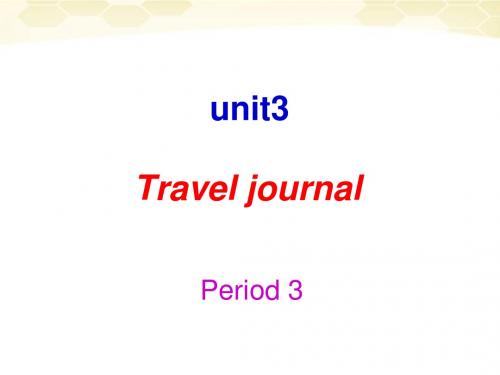
• one thousand dollars a month is not a fortune but world help cover my living ______. • A. bills B. expenses C. prices D. charges
C
3. Ever since middle school, my sister Wang Wei and I have dreamed about taking a great bike trip. 从中学起, 我姐姐王薇和我梦想作一次 了不起的自行车旅行。 dream about/of 梦想, 梦见 如: I dreamed about flying last night. He dreams of becoming a famous violinist one day.
to cycle along the entire Mekong River
from where it begins to where it ends. 首先想到要沿湄公河从源头到终点骑车 旅游的是我的姐姐。 这是一个强调句。 其基本结构为: It is/was + 被强调部分 + that-/who- 从句
the Chinese part of the river that is called the Mekong River in other countries 是一个名词短语, 用来修饰前面 的the Langcang River, 其中又含有一个
定语从句that is called the Mekong River
4. Two years ago she bought an expensive
mountain bike and then she persuaded
最新人教版八年级上册英语Unit5 Period 3预习案(Reading)
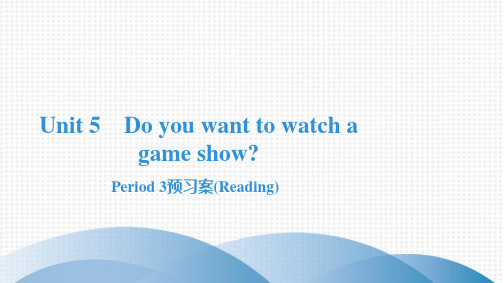
英语
课前预习
一、必背单词
动词 名词
1.失去;丢失 lose . 2.出现 appear . 3.开始变得;变成 become. 4.(情态动词)可能;可以 might. 5.文化;文明 culture . 6.原因;理由 reason . 7.陆军;陆军部队 army. 8.电影 film .
A.80.
B.87.
C.18.
D.72.
返回
英语
二、请根据课本2b完成短文填空。 “Culture”is a symbol of art and history.One very 6.
famous symbol in American culture is a cartoon.We know and love Mickey Mouse.Over 80 years ago,he first 7. appeared. in the cartoon Steamboat Willie.It was the first cartoon with sound and music.The man behind Mickey was Walt Disney.He became very rich and 8. successful .
A.On November 16,1928. B.On November 18,1928.
C.On November 18,1978. D.In the 1930s.
返回
英语
( A )3.Why did Mickey become so popular? A.Because Mickey was like a common man but he always tried to face any danger. B.Because Mickey was very handsome and he was lucky enough. C.Because Mickey had no problems and he was a great man. D.Because Mickey lost his house and his girlfriend did not like him any more.
选修11文档Unit3Period3

Period Three Task & ProjectⅠ.Words:1.faith n.信心;信仰faithful adj.信任的2.optional adj.非必需的,可选的option n.选择3.fibre n.纤维4.thirst n.渴望;口渴thirsty adj.口渴的5.microscope n.显微镜6.drive n.干劲;驾车出行drive v.驾驶7.bless v t.保佑,祝福8.nursery adj.幼儿教育的nursery n.托儿所9.porter n.行李员;门卫10.jar n.坛子11.turkey n.火鸡12.brunch n.早午餐13.shrink v i. & v t.退缩;(使)缩小14.dignity n.自尊,尊严Ⅱ.Phrases:1.for the taking供自由取用2.nursery rhyme儿歌3.shrink from (doing) something回避(困难等)4.have a thirst for渴望5.believe in信任6.pick up拾起;学会(无意中);见到;接(某人)7.set up建立;组装;引起Ⅰ.Fast reading根据课文内容判断正(T)误(F)(1)The writer thinks his or her father is a hero because of his love and care.()(2)The writer's father left school very early.()(3)The writer's father saved money to buy a big house.()(4)The writer's father is a very kind and careful man.()(5)The writer learned from his or her father that every person is different.() 答案(1)T(2)T(3)F(4)T(5)FⅡ.Careful reading根据课文内容把B栏内容用A栏匹配A BPart (1)A.My father's constant care about me and my brother. Part (2) B.My father's hard childhood.Part (3) C.My father made the best Christmas for us.Part (4) D.What I value about my father.Part (5) E.My father helped his friend's son go on with study.Part (6) F.My father's good qualities of success.Part (7) G.My father helps in our local community.Part (8) H.My father's optimism.答案(1)D(2)A(3)B(4)C(5)G(6)E(7)F(8)H1.This is because some people possess certain qualities that others do not have.这是因为一些人拥有其他人所不具备的品质。
人教版高中英语必修第三册UNIT 3 Period 3课时作业含答案
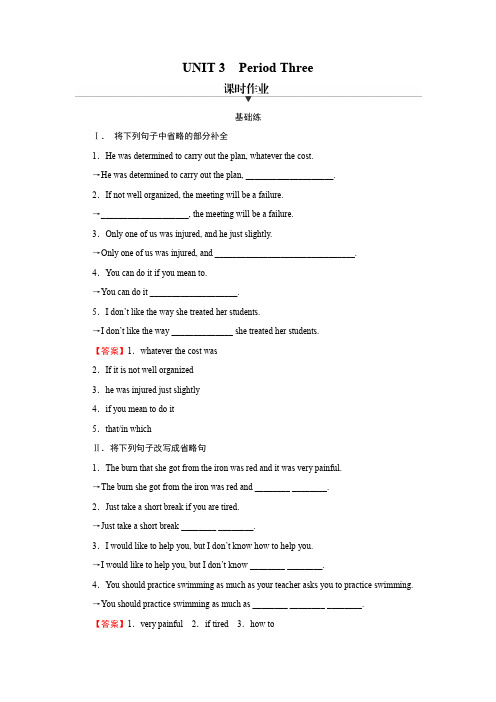
UNIT 3Period Three基础练Ⅰ.将下列句子中省略的部分补全1.He was determined to carry out the plan, whatever the cost.→He was determined to carry out the plan, ____________________.2.If not well organized, the meeting will be a failure.→____________________, the meeting will be a failure.3.Only one of us was injured, and he just slightly.→Only one of us was injured, and ________________________________.4.You can do it if you mean to.→You can do it ____________________.5.I don’t like the way she treated her students.→I don’t like the way ______________ she treated her students.【答案】1.whatever the cost was2.If it is not well organized3.he was injured just slightly4.if you mean to do it5.that/in whichⅡ.将下列句子改写成省略句1.The burn that she got from the iron was red and it was very painful.→The burn she got from the iron was red and ________ ________.2.Just take a short break if you are tired.→Just take a short break ________ ________.3.I would like to help you, but I don’t know how to help you.→I would like to help you, but I don’t know ________ ________.4.You should practice swimming as much as your teacher asks you to practice swimming.→You should practice swimming as much as ________ ________ ________.【答案】1.very painful2.if tired3.how to4.your teacher asksⅢ.按要求翻译句子并连句成文1.汤姆的妈妈正在厨房里一面做饭,一面说话。
最新人教版九年级全一册英语Unit 3 Period 3预习案 (课本P21~P23)

英语
二、请根据课本2b完成短文填空。 Good speakers change the way they speak in 1. different .
situations.The expressions they use might depend 2. on . whom they are speaking to or how well they know each 3.
课前预习
一、必背单词
1.拐角;角落 corner . 2.方位;方向 direction . 名词 3.讲(某种语言)的人;发言者 speaker . 4.住址;地址;通讯处 address . 5.课程;学科 course .
返回
英语
6.便利的;方便的 convenient . 7.正确的;恰当的 correct . 形容词 8.有礼貌的;客气的 polite . 9.直率的;直接的 direct . 10.不礼貌的;粗鲁的 impolite .
. D.convenient
返回
英语
【拓展】英语中常见的否定前缀有: (1)dis⁃表示“分开,分离;不”。如: like喜欢— dislike 不喜欢; agree同意— disagree 不同意 (2)in⁃(im⁃,ir⁃)表示“不,无”。如: possible可能的— impossible 不可能的; polite礼貌的— impolite 不礼貌的
2.向……寻 求/请求
ask
sb.for
6.导入
lead into
3.盼望
look
forward
to
7.和……沟 通
communicate with
4.依靠 depend on
Period 3
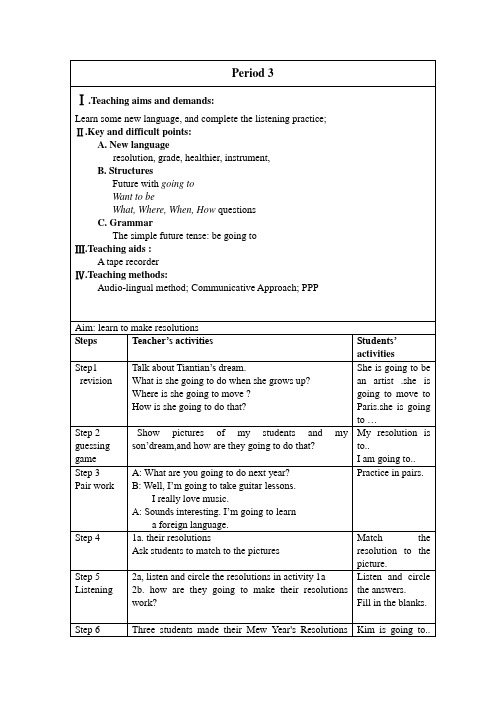
课后反思这是这个单元的第三课时,所以教材内容只有几个词组和两个听力。
新单词就是两个“instrument”和“resolution”,句型是:What are you going to do next year? How are you going to do it? My resolution is to learn to play an instrument. 如果就是实现这两个语言目标,那么就显的太浅显了。
所以这节课,我设计了三条线始终贯穿整堂课。
1.时间线,从远的dream 到明年的resolution再到期末前的resolution。
2.励志线,great resolutions make your dreams come true. 让学生知道要想实现你的梦想就要先制定近期的目标。
3.鼓励线,设计台阶式的resolution,让学生知道要实现梦想就要脚踏实地的一步一步来实现。
教学设计:1.通过自我介绍,我来自云和引出我的梦想,因为温州很美丽,退休后移居温州,有两个目的:一是拉近和学生的关系,二是引出重点句型My dream is to do sth. .2. 台阶式的复习天天的resolutions,来引出great resolutions make your dreams come true。
3. 通过学导生的和自己儿子的resolutions,引出1b的词组,过度到学生自己resolutions,并进行操练目标句型。
4. 听力练习,是根据师的模式,2a 是让学生蒙蒙看,不管答案对错,2b是根据2a来预测,来降低难度,最后进行台阶式的report。
5. 最后是台阶式的期末考前resolutions的制定。
课后评课是老师指出本节课充分挖掘课堂资源,采用丰富多彩的教学方法,设计不同层面的教学活动,激发学生学习英语的兴趣,培养他们英语学习的积极态度。
但是还有细节方面处理的不妥当:1.在处理instruments时,没有放在句子中操练。
人教版高中英语必修一 UNIT Period 3

课前自主预习
课堂新知讲练
突破语法
随堂知能小练
课时作业
英语 必修第一册 配人教版
WELCOME UNIT
5 . 句 ⑤ 中 , 画 线 部 分 作 ______ , 故 本 句 为 结 构 ________。
6.句⑥中,画线部分分别作__________和__________, 故本句为结构__________。
6 partner /'pɑːtnə(r)/ n.
同伴;配偶;合伙人
7 improve
vi.& /ɪm'pruːv/
vt.
改进;改善
课前自主预习
课堂新知讲练
突破语法
随堂知能小练
课时作业
英语 必修第一册 配人教版
WELCOME UNIT
1.期盼;期待
¤重点词块
__l_o_o_k_f_o_r_w_a_r_d_t_o______
课前自主预习
课堂新知讲练
突破语法
随堂知能小练
课时作业
英语 必修第一册 配人教版
WELCOME UNIT
2.主语+谓语+宾语(S+V+O)& 主语+谓语+宾语+状 语(S+V+O+A)
特点:谓语动词是及物动词,不能表达完整的意思,其后 必须要接一个宾语,即动作的承受者。作宾语的可以是:名 词、代词、动词不定式、疑问词+动词不定式、动词-ing形式 或从句等。
课时作业
英语 必修第一册 配人教版
WELCOME UNIT
序 重点 号 词汇
音标
词性 英译 汉
词义
汉译 英
3 organisation /ˌɔːɡənaɪ'zeɪʃ n/ n.
组织;团体;机构
人教新目标九年级英语全一册Unit3period3教学设计
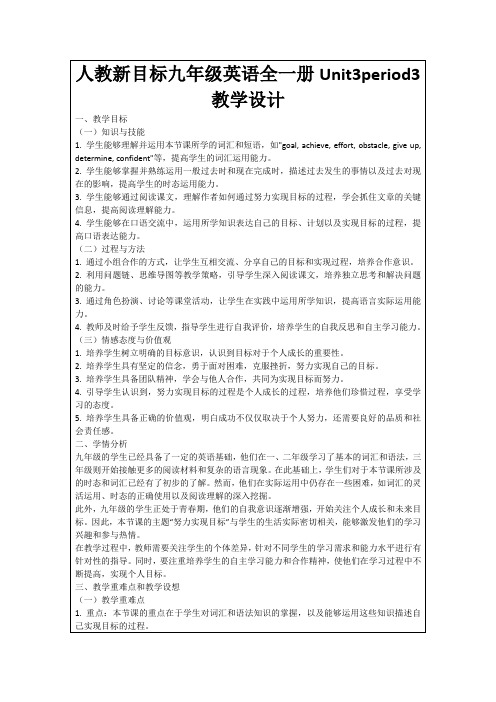
(3)开展小组活动,让学生互相提问、互相解答,提高他们的互动交流能力。
2.针对阅读教学,教师可以采取以下设想:
(1)设计问题链,引导学生深入阅读课文,培养他们的思维能力和阅读技巧。
(2)利用思维导图,帮助学生梳理文章结构,提高他们对文章的理解和记忆。
(二)讲授新知
1.教师呈现课文,引导学生关注标题和图片,预测课文内容。
-提问:“What do you think this passage is about? Can you guess the main idea based on the title and pictures?”
2.学生自主阅读课文,找出文章的主旨和关键信息。
-引导:“What have you learned from this discussion? How can we benefit from working together?”
(四)课堂练习
1.教师设计一系列练习题,让学生运用所学词汇和语法进行书面练习。
-练习题包括填空、选择、改写句子等,涵盖本节课的重点知识。
4.整合教学资源,采用信息技术手段,如多媒体、网络等,为学生提供丰富的学习材料,拓宽他们的视野。
5.注重课后辅导和跟踪,针对学生的学习情况,制定个性化的辅导计划,帮助他们巩固所学知识,提高学习效果。
四、教学内容与过程
(一)导入新课
1.教师以提问方式引导学生回顾前两节课的内容,检查学生对词汇和语法的掌握情况。
-提问:“What have we learned today? Can you name some key vocabulary, grammar points and reading skills?”
高分突破人教版八年级上册--Unit 3 Period 3预习案(Reading)

英语
(2)His lifestyle is different from (与……不同) mine. (3)This story is similar to (与……相似) that one.They have the same (相同的) ending. (4)Their classroom is the same as (与……一样) ours.
(例如)
返回
英语
2.You don't need a lot of them as long as they're good.不在多而 贵在好。 as long as 意为“只要……”,后面接句子,这句子称作条件 状语从句。如: We will go for a picnic as long as the weather is fine.只要天气 好,我们将去野餐。
返回
英语
(1)他喜欢什么? What does he like?
(2)他是个什么样的人?(包括外貌、性格) What is he like ? (3)他长什么样?(指长相) What does he look like ? (4)They sell many kinds of fruit, like /such as oranges,bananas and apples.
In fact ,I'm more outgoing than him.
返回
英语
4.你和我有相同的爱好。
You have the same hobby /hobbies as
I.
5.Lisa 的笔记本和 Sarah 的很像。
Lisa's notebook is similar to
Sarah's.
最新人教版八年级上册英语Unit4 Period 3预习案(Reading)
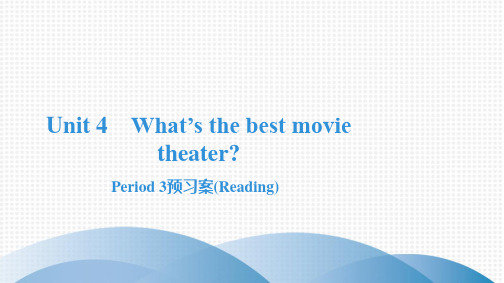
英语
4.我经常编造故事逗我弟弟笑。 I often make up stories to make my brother laugh. 5.我们必须认真对待作业。 We have to take the homework seriously .
返回
英语
思考探究
1.Talent shows are getting more and more popular.才艺表演节
passage?
A.American Idol.
B.America’s Got Talent.
C.China’s Got Talent.
D.China Idol.
返回
英语
( B )2.What does the word “they” in “in fact they are just
actors” refer to(指代)?
返回
英语
三、经典句型
1.观看别人展示他们的 才艺总是有趣的。
It’s always interesting to watch other people show
their talents.
2.所有的这些节目有一 All these shows have one
个相同特征。
thing in common.
返回
英语
课前预习
一、必背单词
1.天资;天赋 talent .
2.魔术师 magician .
名词
3.作用;职能;角色 4.获胜者;优胜者
role . winner.
5.奖;奖品;奖金 prize .
6.实例,范例 example.
副词
7.美好地;漂亮地 beautifully . 8.严重地;严肃地;认真地 seriously
七年级下册英语Period 3 训练案 (Reading课本P23)
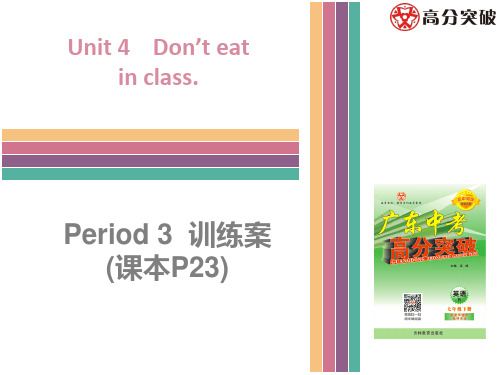
she must do her 5.____________ homework .She can play
weekends only on 6.___________.After dinner,she can’t relax 7.___________ ,either.
能力阶梯 read She must 8.___________ a book before she
she runs to school because she can’t be late.
能力阶梯
more At school,there are 3.___________ rules— noisy don’t be 4.___________ ,don’t eat in cschool because
between two classes may get you hurt(受伤).
能力阶梯
( D)17.Making a fire(火)in the bedroom is very dangerous. ( B )18.When you get angry with anybody, you fight against him.This is not good at all.
cross the road
D.follow the traffic rules
能力阶梯
( C )15.The underlined word “clear”means _____ in this passage. A.无罪的 B.健康的 C.畅通的 D.透明的
Period 3 倒装句
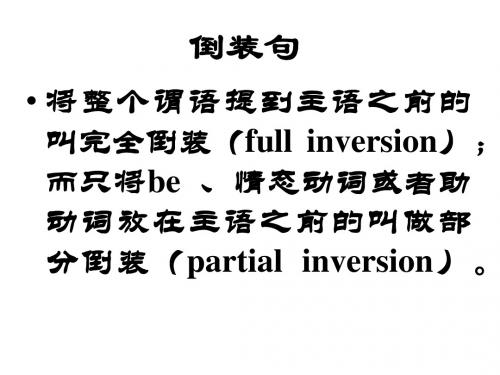
• (2)在There be (exist、 在 、 happen、live、appear、lie、 、 、 、 、 occur、rise、seem、come、 、 、 、 、 remain、stand等)句型中。 句型中。 、 等 句型中 • 1.There are thousands of people in the square. • 2.There stands a tall tree in front of our school gate.
• 3.位于句首的only只修饰主语 位于句首的only只修饰主语 位于句首的 部分,不倒装。 部分,不倒装。如: • Only the teachers are allowed to use this room. • 只有教师可以使用这个房间。 只有教师可以使用这个房间。 • Only some of the children like English. • 只有一些孩子喜欢英语。 只有一些孩子喜欢英语。
• 1.疑问句中,如果疑问词作主 疑问句中, 疑问句中 语或主语的修饰语, 语或主语的修饰语,主谓不倒 装 。 如: What happened to her? ? • 她出了什么事? 她出了什么事? • How many persons are working in that laboratory?有多少人在 ? 那间实验室里工作? 那间实验室里工作?
1. Seldom had I seen such a beautiful picture. 2.Hardly had I arrived home when the phone rang. 3.Not until I began to work did I realize how much time I had wasted.(MET90)
Unit8BirthdaysPeriod3教案及案例反思

-通过合作学习,培养学生的团队合作意识和沟通能力。
3.课后拓展应用
教师活动:
-布置作业:根据Unit 8 Birthdays,布置适量的课后作业,巩固学习效果。
-提供拓展资源:提供与Unit 8 Birthdays相关的拓展资源(如书籍、网站、视频等),供学生进一步学习。
2.辅助材料:准备与教学内容相关的图片、图表、视频等多媒体资源,包括年龄、生日、祝福相关的图片,情态动词can的例子,以及西方生日庆祝的视频等。
3.实验器材:本节课不涉及实验,无需准备实验器材。
4.教室布置:根据教学需要,将教室布置为分组讨论区,每个小组围坐在一张桌子旁,以便于小组讨论和互动交流。同时,设置一个展示区,用于学生展示自己的作品和文化分享。
5.教师评价与反馈:针对学生在课堂表现、小组讨论成果展示、随堂测试和作业完成情况等方面的表现,给予学生及时的评价与反馈。例如,对学生的课堂表现给予鼓励和指导,对小组讨论成果展示给予肯定并提出改进建议,对随堂测试和作业完成情况给予评价并提出改进建议。
5.信息技术准备:确保多媒体设备正常运行,如投影仪、计算机等,以便于展示多媒体资源和进行课堂互动。
6.教学工具:准备白板或黑板,以便于书写和展示重点知识点。
7.作业材料:准备相关的作业题目,如练习册、网上作业等,以确保学生能够巩固所学知识。
8.文化材料:准备有关西方生日庆祝的文化素材,如生日蛋糕、礼物等,以便于学生更好地了解和体验西方文化。
Unit 8 Birthdays Period 3教案及案例反思
授课内容
授课时数
授课班级
授课人数
授课地点
授课时间
教学内容
本节课为人教版新目标英语八年级下册Unit 8 Birthdays的第三课时(Period 3)。本节课的主要内容包括:学习关于年龄、生日和祝福的词汇;听懂并运用情态动词can询问和描述人的能力;运用本课所学语言知识,谈论人们的生日聚会,进一步了解西方文化中关于生日庆祝的习惯。通过本节课的学习,学生能够提高听、说、读、写的综合语言运用能力,同时增强对西方文化的认识。
Period 3 完成时态 用法 笔记后附加练习

3个时态的区别 个时态的区别
1..现在完成时和一般过去时的区别 现在完成时和一般过去时的区别: 现在完成时和一般过去时的区别 例句: 例句: 1.He lived in Paris in 2001. 有具体过去时间----过去时 过去时) (有具体过去时间 过去时) He has lived in Paris since 2001.
判断题 1.I have bought this book for two weeks. F I have had this book for two weeks. (正确) 正确)
T 2. The class has begun. The class has begun for 10 minutes. F The class has been on for 10 minutes. 3. I have opened/closed the door since I left. F T I have been open/ closed since…
我曾去过那两次: ____ 我曾去过那两次:I have been there twice. has gone 2.Where is he? He _________to the library. 3. He ______________the library for two has been in hours.
这类动词常见的过去分词变化有: 这类动词常见的过去分词变化有: opened/ closed--been open/ closed borrowed---kept came/ went /moved---been in joined/ taken part in—been in become---been leave---been away ( from) died --- been dead bought---had begun ---been on
- 1、下载文档前请自行甄别文档内容的完整性,平台不提供额外的编辑、内容补充、找答案等附加服务。
- 2、"仅部分预览"的文档,不可在线预览部分如存在完整性等问题,可反馈申请退款(可完整预览的文档不适用该条件!)。
- 3、如文档侵犯您的权益,请联系客服反馈,我们会尽快为您处理(人工客服工作时间:9:00-18:30)。
Period 3Objectives:1To learn modal verbs …should‟ and …ought to‟2To learn how to correct peoplePreparation1SB 8A, pages 7 and 82Photocopiable page 3Teaching procedurePre-reading preparationShould and ought to1In this language section, three uses of should and ought to are discussed. The first two of the following three points are covered in Part A talking about what it is best or right to do. The third point is covered in Part B talking about correcting people.①Shoud/Ought to is used to make suggestions about what it is best to do②Should/Ought to is used to express our strong belief that something is right and is our duty③should/ought to is used to correct errors and to say what is correct2Should and ought to are modal verbs and do not take verbal endings. Remind students that oughted is an impossible form, as this is rather a common mistake.3By learning the form as ought to, students are less likely to get confused about whether to use a to infinitive or a bare infinitive.4Ask students the following questions. Tell them to reply in full sentences. Possible answers have been given in brackets.1 What should we do if we want to get high marks? (We should work hard.)2 What ought we to do if we find a purse on the classroom floor? ( We ought to take it to the teacher.)3 How should we treat our parents when they are old? (We should look after them.)4 How should table be spelled? ( It should be spelled t-a-b-l-e.)5 He are fat is wrong. What ought we to say? ( We ought to say he is fat.)5Read the examples in the pictures with the class, explaining that a typewriter and a cooker are machines, not people.While-reading procedure1Language focusshould和ought to都是情态动词,常用来提供或征求意见,或表达说话者认为应该做的事,意思为“应该”、“应当”。
1.“should/ought to+动词原形”表示应该做某事,或做某事的动机是正确的。
如:Tom should go to bed earlier. He goes to bed very late and he‟s always tired. 汤姆应该早点睡觉。
他很晚睡觉,总是觉得很累。
It‟s a very nice film. You ought to go and see it. 这是部很不错的电影。
值得一看。
“shouldn‟t(=should not)/oughtn‟t to(=ought not to)+动词原形”表示不该做某事,或做某事的动机是错误的。
如:Tom shouldn‟t go to bed so late. 汤姆不该这么晚才睡觉。
You watch TV all the time. You oughtn‟t to watch TV so much. 你一直在看电视。
你电视不该看这么多。
should和ought to用在疑问句中时,常用来询问他人的见解或建议。
如:— Ought I to finish my homework now? 我应该现在就把作业做完吗?— Yes, you ought to. 是的,应该的。
When should I leave home tomorrow? 我明天应该几点从家里出发?2.should意为“应该”,多用于劝说他人的错误行为或给予他人一些建议,不具备强制力;而must意为“必须”,用于规定或约束他人的行为,具有强制力。
试比较:You shouldn‟t be cruel to animals. 你不该虐待动物。
(不具备强制力)You mustn‟t park your car here. Drive it away immediately. 你不可以把车停在这里,立即开走。
(具有强制力)3.should和ought to常用动词think连用。
如:1)I think … should/ought to …,如:I think Carol should buy some new clothes. 我认为卡罗尔该买些新衣服了。
It‟s late. I think I ought to go home now. 不早了。
我想我该回家了。
2)I don‟t think … should/ought to …,如:I don‟t think you should work so hard. 我认为你无需如此卖力。
I don‟t think we ought to go yet. It‟s too early. 我认为我们没必要这么早走。
时间早着呢。
3)Do you think … should/ought to …?,如:Do you think I should buy that hat? 你认为我们该买那顶帽子吗?What time do you think we should go home? 你觉得我们应该何时回家?2Ask the class to do Exercise A and B. Call on selected students to check their answers when the class has finished working through exercises.3Ask students to work in pairs to complete the dialogue between Pansy and Tony in the exercise.4Check the answersExercise A1 ought to elect2 should choose3 should buy4 ought to discuss5 shouldn‟t startExercise B2 …50‟ years old3 white …shirts‟ and ties4 a Kentucky Fried …Chicken‟ restaurant5 no …planes‟ could land at the airport6 …died‟7 a …fast food‟ shopPost-reading activities1Write these guide words about keeping a pet dog on the board.feed regularlyhitput a collar onteach/to walk on a leadforget to give water tolet/run on the roadgive/plenty of exercisekeep/cleantie up/all the timeleave/locked in a carThen ask students to write five sentences saying what you should do and five sentences saying what you ought not to do using the above guide words.Possible sentences are:You should feed your dog regularly.You should put a collar on your dog.You should teacher your dog walk on a lead.You should give your dog plenty of exercise.You should keep your dog clean.You ought not to hit your dog.You ought not to forget to give water to your dog.You ought not to let your dog run on the road.You ought not to tie up your dog all the time.You ought not to leave your dog locked in a car.2For further practice, ask students to write three should rules and three should not rules ( or ought to and ought not to rules) for different groups of people ( e.g., friends, shop assistants, teachers, travelers, cyclists, etc.).Possible rules are:A friend should always help you.A friend should listen to you.A friend should tell you the truth.A friend should not gossip about you.A friend should not hurt you.A friend should not forget you.3Ask students to write their own …misprints‟. Let them see if their friends can find the mistakes and correct them. Write these examples on the board.Can I have some bread and batter? (butter)My sister gave me a red pocket. (packet)The chicken soap was very nice. (soup)I like eating fish and chops. (chips)These noodles are very tasteful. (tasty)If you know the answer, rise your hand. (raise)He was tired. So he laid on the bed. (lay)4Tell students to work in pairs for five minutes. Then call on a few students to write their sentences on the board or read their sentences to the class, who must spot and replace the words in error.ConsolidationAsk students to think about what we should/shouldn‟t do or ought to/ought not to do to make our school life better.We should/ought to ________We shouldn‟t/ought not to _______1Look at the pictures and u se ‘We should/shouldn’t…’ or ‘ We ought to/ought not to…’ to express the meaning of the pictures.(看图片,用We should/shouldn’t …或用We ought to/ought not to…的句型来表达图片的含义。
